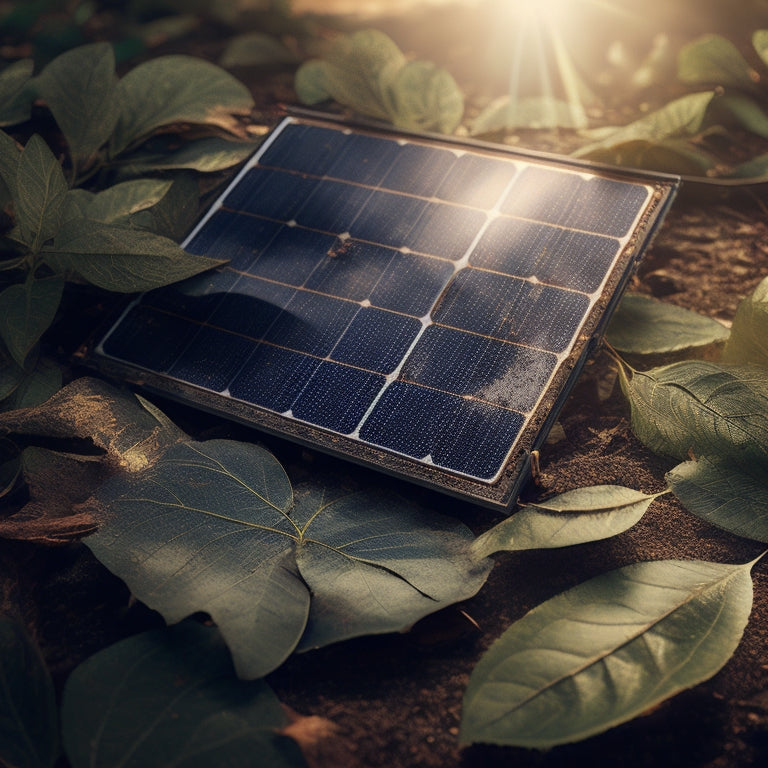
Clean Your Way to Better Solar Efficiency
Share
You can boost your solar panel's energy output by up to 10% simply by keeping them clean, as dirt and debris can reduce their efficiency by up to 25%. Regular cleaning is essential to maximize energy savings, minimize revenue shortfalls, and optimize system performance. Use gentle and effective removal methods, such as robotic cleaning or ultrasonic cleaning, and avoid harsh chemicals and abrasive materials. By following DIY cleaning tips and taking precautions to avoid damage, you'll be on your way to better solar efficiency. Now, discover the best methods to keep your panels clean and running at their best.
Key Takeaways
• Regular cleaning of solar panels can increase energy output by up to 10% and reduce revenue shortfalls over time.
• Dirty panels can reduce energy output by up to 25%, making regular cleaning crucial for maximum energy savings.
• Use soft-bristled brushes, gentle water sprays, and mild soap to remove dust and debris without damaging panels.
• Avoid harsh chemicals and abrasive materials that can scratch or break solar panels, and handle them with care.
• Clean panels operate at their best temperature, converting sunlight into electricity more efficiently than dirty panels.
Dust and Debris Removal Methods
When it comes to maintaining your solar panels, regular cleaning is crucial, and using the right dust and debris removal methods can make all the difference in optimizing energy output. You'll want to choose a method that's effective, efficient, and gentle on your panels.
One option is robotic cleaning, which uses automated systems to remove dirt and debris. These robots are equipped with soft-bristled brushes or gentle water sprays that won't scratch or damage your panels.
Another method is ultrasonic cleaning, which uses high-frequency sound waves to create a cleaning solution that lifts dirt and grime off the surface of your panels. This method is particularly effective for removing stubborn dirt and stains.
Both robotic and ultrasonic cleaning methods can be used in conjunction with other cleaning solutions, such as water and mild soap, to make sure your panels are spotless and running at peak performance.
Importance of Regular Solar Cleaning
Regular solar panel cleaning is vital because it directly impacts your system's energy output, and neglecting this maintenance task can result in significant energy losses and revenue shortfalls over time. In fact, research shows that dirty solar panels can reduce energy output by up to 25%.
This reduction in energy production not only affects your wallet but also has a negative environmental impact. By regularly cleaning your solar panels, you're guaranteeing maximum energy savings and minimizing your carbon footprint.
As a responsible solar panel owner, it's essential to prioritize cleaning to maximize energy production. A clean solar panel system can increase your energy output, leading to significant energy savings over time. Furthermore, by optimizing your system's performance, you're reducing your reliance on non-renewable energy sources, resulting in a lower environmental impact.
DIY Solar Panel Cleaning Tips
For successful DIY solar panel cleaning, begin by gathering necessary materials, including a soft-bristled brush, a hose with a spray nozzle, and a mild soap specifically designed for cleaning solar panels.
Next, perform a thorough panel inspection to identify any areas with heavy debris buildup. This will help you focus your cleaning efforts and maximize efficiency.
When cleaning, use a gentle touch to avoid scratching the panels. Start by spraying the panels with water to loosen dirt and debris. Then, use the soft-bristled brush to gently scrub away any stubborn grime.
Be mindful of water conservation and avoid using excessive amounts, as this can lead to waste and increased cleaning time.
After scrubbing, rinse the panels thoroughly with clean water to remove any remaining soap residue. Use a clean water rinse to ensure a spotless finish.
Avoiding Damage During Cleaning
How can you guarantee you're cleaning your solar panels without causing damage, especially when dealing with sensitive components and fragile materials? When it comes to cleaning your solar panels, it's important to avoid damaging the delicate surfaces. You must take extra precautions to make sure you're not scratching or breaking any of the panels' components.
Here are some essential tips to help you avoid damage during cleaning:
-
Use soft, non-abrasive cleaning materials: Avoid using scrubbers, brushes, or any other materials that can scratch the panels' surfaces. Instead, opt for soft, microfiber cloths or specialized cleaning tools designed for solar panels.
-
Avoid using harsh chemicals: Never use strong detergents, acids, or abrasive cleaners, as they can damage the panels' coatings or harm the materials. Stick to mild soap and water or specialized solar panel cleaning solutions.
-
Handle panels with care: Be gentle when handling the panels, as they can be fragile. Avoid applying excessive pressure, bending, or twisting, which can cause cracks or breaks.
- Invest in specialized equipment: Consider investing in specialized cleaning equipment, such as water-fed poles or automated cleaning systems, designed specifically for solar panels. These tools can help minimize the risk of damage and make the cleaning process more efficient.
Optimizing Efficiency With Clean Panels
By maintaining your solar panels clean, you can greatly enhance their energy output, as even a thin layer of dirt or debris can reduce their efficiency by up to 25%.
Clean panels are crucial for peak energy harvesting, as dirt and debris can increase panel temperature, diminishing their ability to convert sunlight into electricity. When panels are dirty, they heat up, which decreases their efficiency and overall performance. This is because high temperatures reduce the panel's capacity to convert sunlight into electricity, leading to reduced energy output.
By keeping your panels clean, you can guarantee that they're operating at their best temperature, resulting in increased energy harvesting. In fact, studies have shown that clean panels can increase energy output by up to 10%.
Frequently Asked Questions
Can I Use a Pressure Washer to Clean My Solar Panels?
You shouldn't use a pressure washer to clean your solar panels, as high water pressure can damage the panels or their seals. Instead, opt for a wide-angle nozzle with low pressure to prevent damage.
How Often Should I Clean My Solar Panels in a Dusty Area?
In dusty areas, you'll need to clean your solar panels every 2-3 months, as dust accumulation can reduce efficiency by up to 25%. Consider environmental factors like wind direction and nearby construction sites to adjust your cleaning schedule.
Will Cleaning My Solar Panels Really Make a Big Difference?
You'll be surprised how much cleaning your solar panels boosts energy output - up to 25%! By removing dirt and debris, you'll not only increase efficiency but also reduce maintenance costs in the long run.
Can I Clean My Solar Panels at Night or During the Rain?
You should avoid cleaning your solar panels at night, as moonlight reflections can create uneven cleaning results. Similarly, cleaning during rain is not recommended, as raindrop angles can push debris around, making the panels dirtier.
Do I Need to Clean the Entire Solar Panel or Just the Glass Surface?
When cleaning solar panels, you'll typically only need to clean the glass surface, as dirt accumulates there. However, if your panel's frame design allows debris to collect underneath or the panel angle allows dirt to slide down, cleaning the entire panel may be necessary.
Related Posts
-

Why Outdoor Solar Lighting Systems Are Sustainable
Outdoor solar lighting systems are sustainable because they utilize renewable energy, drastically reducing your carbo...
-
Average Lifespan of Solar Battery Banks
The average lifespan of solar battery banks generally ranges from 5 to 15 years. This variation mainly stems from the...
-

Cost of Home Solar Battery
You're looking to invest in a home solar battery to reduce your grid reliance, but you're curious about the cost. The...

